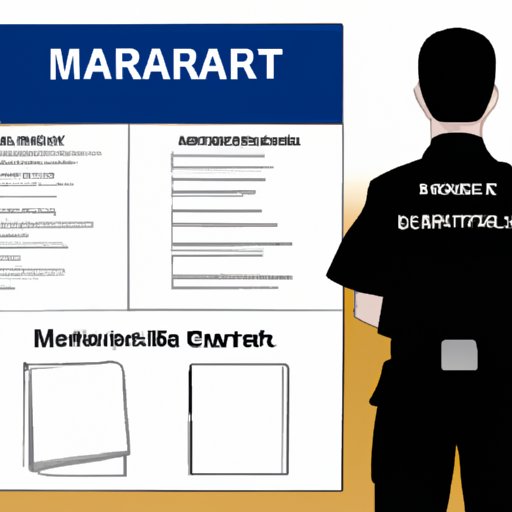Introduction
Air Marshals are the last line of defense against terrorism on airplanes. They provide a high level of security onboard commercial flights and ensure that passengers remain safe from potential threats. This article will provide an overview of what it takes to become an Air Marshal, including qualifications, training and certification processes, duties and responsibilities, and the benefits of the job.
Qualifications for Becoming an Air Marshal
In order to become an Air Marshal, there are certain qualifications that need to be met. These include educational requirements, physical requirements, and other requirements.
Educational Requirements
The educational requirements for becoming an Air Marshal vary depending on the agency you’re applying to. However, most agencies require applicants to have at least a high school diploma or equivalent. Depending on the agency, candidates may also need to have completed some college coursework or have a college degree.
Physical Requirements
Air Marshals must be in good physical condition and be able to maintain their physical fitness throughout their career. Candidates must pass a physical fitness test prior to being accepted into the program. This test includes running, push-ups, sit-ups, and other exercises.
Other Requirements
In addition to the educational and physical requirements, there are other requirements candidates must meet in order to become an Air Marshal. Candidates must be U.S. citizens, have a valid driver’s license, pass a background check and drug test, and be willing to travel extensively.
Training and Certification Process for Air Marshals
Once a candidate has been accepted into the program, they will undergo a rigorous training and certification process. This process typically includes both classroom instruction and field training.
Initial Training
The initial training for Air Marshals is extensive and can last up to several months. During this time, candidates will be trained in firearms use, defensive tactics, emergency procedures, and other topics related to their duties. Candidates will also be required to complete simulations and drills in order to demonstrate their proficiency.
Recertification
Air Marshals must undergo regular recertification in order to maintain their certification. This recertification typically consists of additional classroom instruction as well as physical fitness tests and simulations.

Duties and Responsibilities of an Air Marshal
Air Marshals have a variety of duties and responsibilities that must be performed before, during, and after flights. These duties and responsibilities include pre-flight preparation, onboard security measures, and after-flight procedures.
Pre-Flight Preparation
Before each flight, Air Marshals must conduct a thorough pre-flight inspection of the aircraft. This includes searching for any suspicious items, checking for any signs of tampering, and ensuring that all safety protocols are in place. In addition, Air Marshals must review passenger manifests and verify that all passengers have been properly screened before boarding.
Onboard Security Measures
Once the plane is in the air, Air Marshals must remain vigilant and alert for any suspicious activity. This includes monitoring the cabin for any unusual behavior and responding appropriately if any threats arise. Air Marshals must also be prepared to take action if necessary.
After-Flight Procedures
After the flight has landed, Air Marshals must ensure that all passengers disembark safely and that no suspicious items have been left behind. They must also complete a post-flight report detailing any incidents that occurred during the flight.

Equipment Used by Air Marshals on Flights
In order to effectively perform their duties, Air Marshals must be familiar with the equipment used on flights. This includes personal protective gear, weapons, and communication devices.
Personal Protective Gear
Air Marshals must wear protective gear when performing their duties. This includes body armor, ballistic helmets, and other clothing and accessories designed to protect them from potential threats.
Weapons
Air Marshals must also be proficient in the use of firearms. Depending on the agency, they may carry handguns, shotguns, or other weapons while on duty. All weapons must be kept secure at all times and only used when absolutely necessary.
Communication Devices
Air Marshals must also be familiar with the communication devices used on flights. This includes radios, cell phones, and other electronic devices used to communicate with ground personnel and other Air Marshals.

Benefits of Being an Air Marshal
Being an Air Marshal offers a variety of benefits, both professional and financial. These include professional growth opportunities, financial benefits, and travel opportunities.
Professional Growth Opportunities
Air Marshals have the opportunity to grow professionally through advanced training and certifications. As they gain experience, they may be eligible for promotions or special assignments.
Financial Benefits
Air Marshals are typically paid well for their services. In addition, they may be eligible for overtime pay, shift differentials, and other forms of compensation.
Travel Opportunities
Air Marshals often have the opportunity to travel extensively. This can include domestic and international travel, depending on the agency.
Conclusion
Becoming an Air Marshal requires dedication and commitment. Candidates must meet certain qualifications, undergo extensive training and certification, and be prepared to take on the duties and responsibilities of the job. Air Marshals benefit from professional growth opportunities, financial benefits, and travel opportunities. For those looking for a challenging and rewarding career, becoming an Air Marshal may be a great choice.
(Note: Is this article not meeting your expectations? Do you have knowledge or insights to share? Unlock new opportunities and expand your reach by joining our authors team. Click Registration to join us and share your expertise with our readers.)
